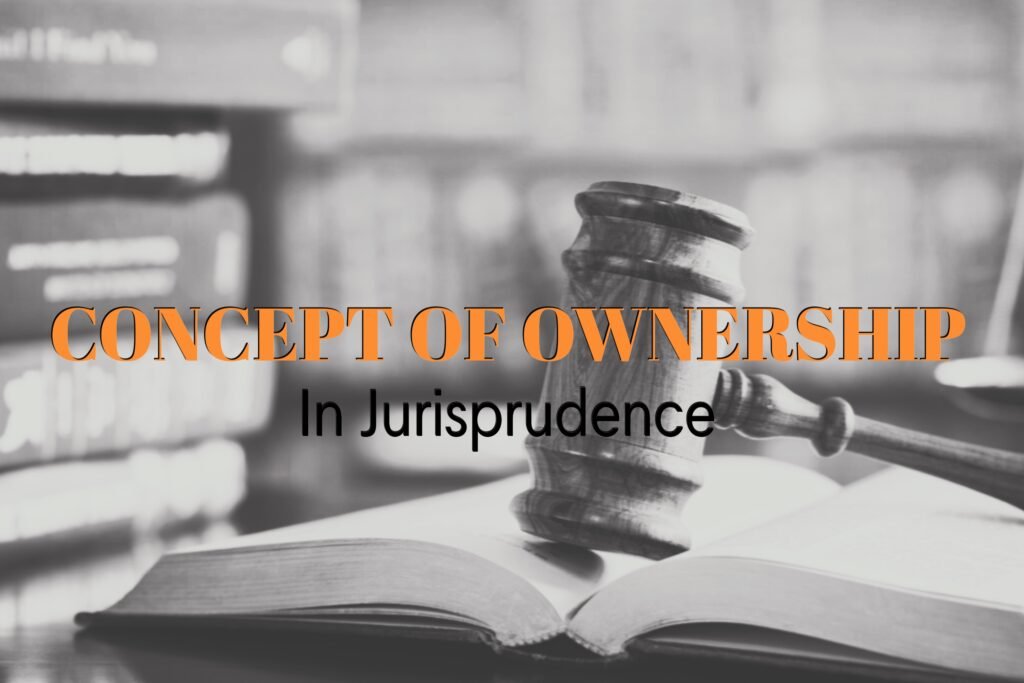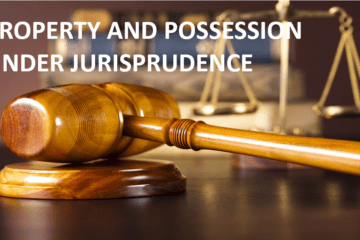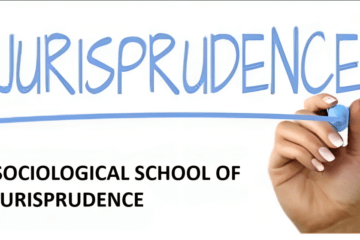
Ownership refers to the relation that a person has with an object that he owns. It is an aggregate of all the rights that he has with regards to the said object. These rights are right in rem it means that they can be enforced against the whole world and not just any specific individual.
The prima facie evidence of ownership, called as nine out of ten points of law, meaning that there is a presumption that the possessor of a thing is the owner of it and the other claimants in order to have that thing must prove their title or better possessory right.
Definition of Ownership
According to Austin, ownership refers to “a right indefinite in point of user, unrestricted in point of disposition and unlimited in point of duration.” His definition thus implies three attributes viz.:

Salmond
According to him, ‘Ownership, in its most comprehensive significance, denotes the relation between a person and the right that is vested in him. That which a man owns is in all cases a right.’ Also he states that ‘Every right is owned, and nothing can be owned except a right. Every man is the owner of the rights which are his.’
He also distinguished between corporeal and incorporeal ownership, ‘Although the subject-matter of ownership in its widest sense is in all cases a right, there is a narrow sense of the term in which we speak of the ownership of material things. We speak of owning, acquiring or transferring, not rights in land or chattels, but the commonest meaning of the ‘ownership’. We call it by the name of corporeal ownership to distinguish it from the ownership of rights which may be called ‘incorporeal ownership’.
Holland
He followed Austin’s view of ownership and according to him an owner has three kinds of powers namely;
- possession,
- enjoyment and
- ownership
- all or some of which can be lost by lease or mortgage.
Hilbert
According to him, ownership consists of four rights which are the right of using the thing, right of excluding others from using it, right to disposal of the thing and right of destruction of the thing. In this regard absolute ownership in land is not possible since land is indestructible, which is why in English Law one can have a legal interest in land.
Pollock
According to him, ’Ownership may be described as the entirety of the powers of use and disposal allowed by law.’
Essentials of Ownership
Following essentials of it, namely-
- Right to use: The owner has right to use the subject-matter of ownership as per his own discretion.
- Right to the capital or alienation: The owner has absolute right of alienating with the thing. A non-owner may possess a thing but he cannot transfer its ownership.
- Right to income: The owner has the right to the income arising out of the thing within the limits, if any, laid down by any law.
- Right to possess: The owner of a thing has a right to possess it, and the owner has exclusive control of a thing.
- Right to manage: The owner has the right to manage i.e., he has the right to decide how and by whom the thing shall be used.
Characteristics of Ownership
- It is absolute or restricted. An owner of a property may be its absolute owner and nobody else may have any interest in the same. There may also be certain restrictions on the right of ownership and those restrictions may be imposed either by law or by voluntary agreement.
- It is also possible that certain restrictions may be imposed on the owners of property in times of national emergency. The house of any owner may be requisitioned and any compensation may be fixed by the prescribed authority.
- The ownership of a person does not come to an end with his death. He is entitled to leave his property to his property to his successors. The owner can distribute the property even in his own lifetime.
- Certain disabilities have been imposed on infants and lunatics with regard to the disposal of property. Undoubtedly, they are not competent to enter into valid contracts. They are not expected to understand all the implications of their actions.
- The Government may demand certain taxes from the owners of the property. If those taxes are not paid, the Government may seize their property of that portion of the property which is necessary to realize the money due to the Government.
Modes of acquiring Ownership
Under modern law, modes of acquiring ownership may be classified under two heads:
(i) Original mode; and
(ii) Derivative mode.
- Original mode: This mode is the result of some independent personal act of the acquirer himself. It is of following kinds:
- Absolute mode: In this mode, ownership is acquired over previously ownerless object.
- Extinctive mode: In this mode, there is extinction of previous ownership by an independent adverse act on part of the acquirer.
- Accessory mode: In this mode, requisition of ownership is the result of accession.
- Derivative mode: When ownership is derived from a previous owner, it is called derivative acquisition of ownership. It is derived by any of the following modes:
- Title of prior owner: In agreement, a title is acquired with the consent of the previous owner. It is only limited to contracts but includes all bilateral acts which create an interest. Such agreement may be either by grant or by assignment.
- Purchase: A contract for sale does not confer title in immoveable property. As per Section 54 of the Transfer of Property Act, a contract for sale of immoveable property is a contract that such sale shall take place on terms settled between the parties. However, if a person has entered into possession under a contract for sale and is in peaceful and settled possession of the same with the consent of the person having the title thereto, he is entitled to protect his possession against the whole world.
- Gift: It should be voluntary and without consideration and it may be movable or immovable. As per Section 123 of the Transfer of Property Act, the transfer by way of gift must be affected by a registered instrument signed by or on behalf of donor and attested by at least two witnesses, or by way of delivery.
- Succession: In this regard, it has been held in several judgments that genuineness of will has to be established.
Kinds of Ownership
Ownership may be of following kinds-
- Corporeal and Incorporeal Ownership-
Corporeal ownership refers to the ownership of material objects whereas incorporeal ownership refers to ownership of intangible things. Examples of corporeal ownership include ownership of a house, table, car, etc. whereas incorporeal ownership includes ownership of trademarks, copyright, patents, etc.
- Trust and Beneficial Ownership–
The subject-matter of such ownership consists of property owned by two persons wherein one person is obligated to use it for the benefit of the other. The person under such an obligation is called the trustee and his ownership is known as trust ownership. The person to whose benefit the property is to be used is called the beneficiary and his ownership is known as beneficial ownership.
- Legal and Equitable Ownership–
Legal ownership refers to the ownership as recognized by the rules of a legal system whereas equitable ownership refers to the ownership as recognized by the rules of equity. There may be cases wherein law does not recognize the ownership due to some effect but equity does.
- Vested and Contingent Ownership–
All kinds of ownership may either be vested or contingent. In vested ownership, the title of the person is perfect. On the other hand, ownership can be said to be contingent if it is imperfect and can be perfected subject to the fulfillment of certain conditions. Therefore, contingent ownership is conditional in nature.
- Sole Ownership and Co-ownership–
When a property is owned by only one person at a time. Such ownership is known as sole ownership. However, in certain cases, same property may be vested in two individuals at the same time. This is known as co-ownership. For instance, partners of a firm are co-owners of the partnership property.
Difference between Ownership and Possession




0 Comments